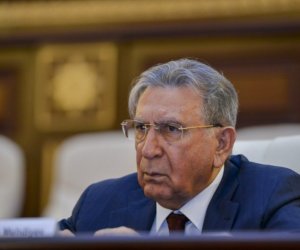Azerbaijan improves position on Transparency corrution list

Transparency International is warning that the abuse of power, secret dealings, and bribery within the public sector continue to "ravage" countries around the world, including in the Commonwealth of Independent States (CIS).
The assessment is based on the annual "Corruption Perceptions Index" published by the Berlin-based organization on December 3.
The index ranks 177 countries by their perceived levels of public-sector corruption. It draws on surveys covering expert assessments and views of businesspeople.
In the index, more than two-thirds of the countries score below 50, on a scale from 0 (perceived to be highly corrupt) to 100 (perceived to be very clean).
Transparency International says that demonstrates corruption remains one of the world’s biggest challenges, particularly among political parties, police, and justice systems.
"Speaking of countries in the former Soviet Union, I would say that we have nothing to celebrate this year because the picture is rather gloomy and can be described as stagnation across all the countries," says Svetlana Savitskaya, Transparency International's program coordinator for Europe and Central Asia.
"Even Georgia, commonly known as a champion of anticorruption reforms in Eastern Europe and former Soviet Union region, has dropped compared to the last year."
In the "Corruption Perceptions Index 2013," Georgia ranks 55th with a score of 49, compared to a score of 52 in 2012.
CIS: Backsliding Or Stagnant
Elsewhere in the Caucasus, Savitskaya says the scores of Armenia (94th) and Azerbaijan (127th) have shown some "negligible" improvement.
Savitskaya says the scores for all other CIS countries have either deteriorated -- like Moldova (102nd), Belarus (123rd), Ukraine (144th), and Kazakhstan (140th) -- or remained the same as last year in the case of Russia (127th), Kyrgyzstan (150th), and other Central Asian countries.
Tajikistan (154th), Turkmenistan (168th), and Uzbekistan (168th) remain this year among the worst scorers.
Savitskaya says a number of factors conspire to make fighting corruption difficult in CIS countries.
"These countries have the same disease sort to say, which is strong patronized networks and concentration of economic and political power in the hands of ruling elites," Savitskaya says.
"And also there is a very blurred line between political and business interests. Then we also have weakness of the judiciary and police."
Savitskaya adds that public officials can often operate with very limited transparency and accountability, while external watchdogs such as media and civil society remain marginalized in countries like Belarus, Armenia, and Azerbaijan. She says that civic activism can help things change.
"I think as a positive trend, we see that citizens' engagement and civic activism has significantly increased. Citizens are taking action," Savitskaya says.
"If you look at what is happening in Ukraine these days. They just don't want to accept what the government does. They want to take this European vector of development also because in doing so, they would become more transparent and the corruption would become much, much less in the country," she adds.
In Southeastern Europe, both Macedonia and Montenegro rank 67th, while Bosnia-Herzegovina and Serbia hold 72nd place. Kosovo is 111th.
Afghanistan makes up the worst performer, along with North Korea and Somalia, scoring just eight points. Neighboring Pakistan takes 127th place, Iran 144th, and Iraq 171st.
Denmark and New Zealand tie for first place with scores of 91, followed by Finland, Sweden, and Norway.
(RFE/RL)
ANN.Az
Latest news 
More news 



































 Photo
Photo 



 Video
Video 

